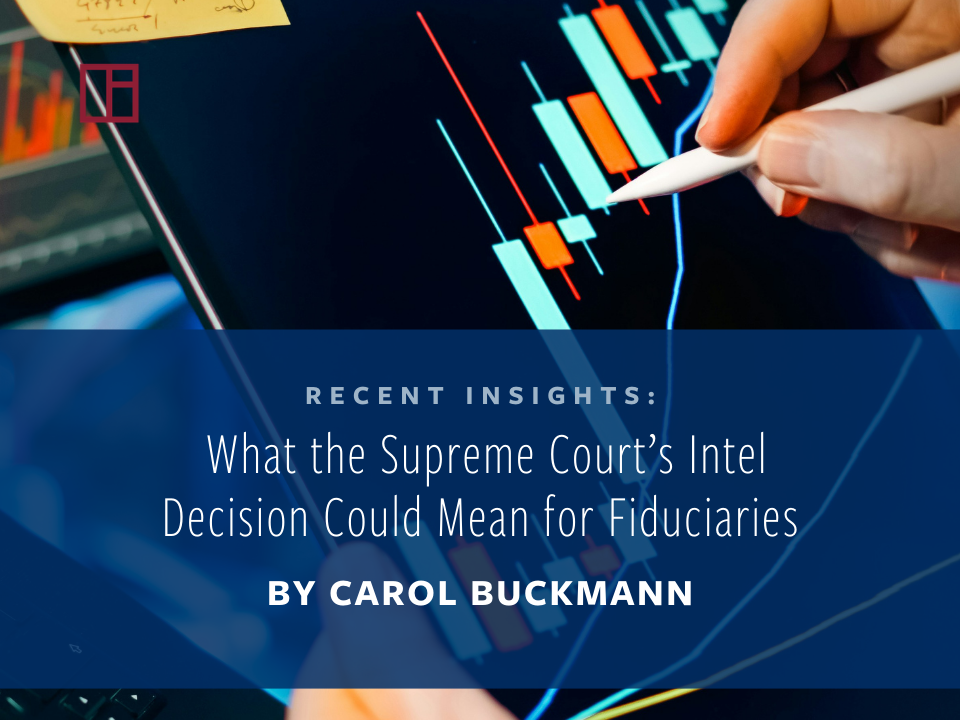The Supreme Court will be ruling on an issue likely to have a major impact on 401(k) plan litigation- whether plaintiffs must plead a meaningful benchmark when challenging plan investments as imprudent. Regardless of how the Court rules, fiduciaries should be prepared to defend their benchmarks used in investment review and communications.
Read MoreINSIGHTS
We share expert insights on executive compensation, retirement plans, fiduciary duties, and more.
Stay updated on the latest legal trends and practical advice for employers and executives.
Congratulations, you’re divorced. Your retirement account didn’t get the memo.
Read MoreHere is a list of benefits changes we’d like to see in 2026. ERISA litigation reform and changing the Roth catch-up requirement feature prominently on the list.
Read MoreMisunderstanding the scope of fiduciary responsibility can be costly. Here are six common myths that prevent fiduciaries from fulfilling their ERISA responsibilities and managing their liability exposure.
Read MoreThis court proceeds from the unstated assumption that all investments which take ESG considerations into account are improper, even when they are related to financial performance. This is just one lower court decision, but what does it mean for plan fiduciaries?
Read MoreThe SEC has been targeting recordkeeper cross-selling practices, but ERISA has its own restrictions that may be violated when a recordkeeper markets to plan participants. What does a recently filed lawsuit against Empower mean for plan sponsors and committees?
Read MoreA good plan governance structure provides a roadmap for fulfilling ERISA fiduciary responsibilities. It can also mitigate the risk of losing a fiduciary breach lawsuit. A prudent process is key.
Read MoreHigh earners will be required to make all catch-up contributions on a Roth basis beginning in 2026. Implementing the new requirement will require applying special rules that don’t apply for any other purpose and will require plan sponsors to coordinate with their recordkeepers and payroll providers. This can’t be done at the last minute.
Read MoreAlternative investments can supplement traditional 401(k) investments by helping to control volatility. However, ERISA plans are not private investors. Fiduciaries who want to add alternative investments to their plans need to do so in a way that complies with ERISA and serves their plan participants.
Read MoreSurveys show that 401(k) participants want lifetime income options, but only a minority of plans offer them. What can we do about it?
Read MoreUnclear ESG rules and fiduciary standards under ERISA are making it harder for plan sponsors to keep up with changing regulations.
Read MoreThe Supreme Court doesn’t issue a lot of ERISA opinions, but when it does, the pension community pays attention. In its recent decision in Cunningham v. Cornell University, the Court made it easier to sue all plans using third party service providers.
Read MoreLate deposit of employee contributions is a common ERISA violation that may involve small dollar amounts. The Voluntary Fiduciary Correction Program (VFCP), is being expanded to allow self-correction of late contributions without a formal filing, but there are important conditions to know about. Terry Moore discusses them in this post.
Read MoreWill common sense prevail? The Supreme Court will be issuing an opinion on what plaintiffs must plead in their complaints in order to claim that plan service arrangements are prohibited transactions. A decision for defendants could rein in fishing expeditions.
Read MoreJeff Mamorsky provides insights into the recent American Airlines decision on ESG investing from the perspective of his role in the drafting of ERISA.
Read More













